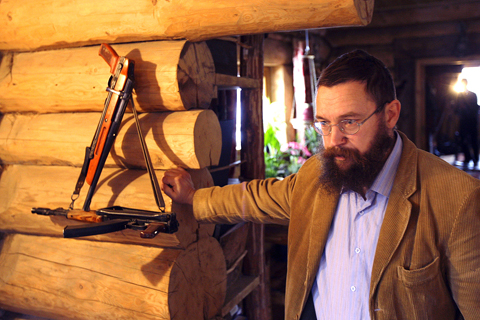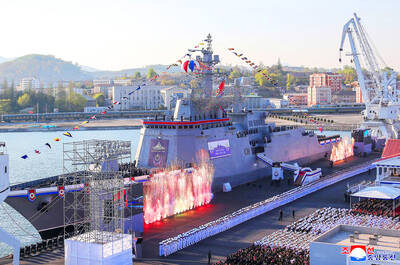The financial crisis has cost some Russian tycoons their fortunes, but one of Russia’s first multimillionaires says he hasn’t lost a kopek.
That’s because one-time boy wonder German Sterligov dropped out of the business world years ago and started raising sheep and other livestock on two farms outside Moscow.
“We’re in clover compared to the oligarchs,” he said. “I’ve got 100 sheep, a horse, a cow, some poultry and goats.”

PHOTO: AP
Sterligov, 41, has no plans to return to the traditional capitalist road, saying his luxury-loving former colleagues will soon see the virtues of simplicity and self-sufficiency. At his log cabin about 96km northwest of Moscow one recent afternoon, hens pecked grain from the snow in front of the porch. He scolded his four sons — aged between four and 12 — for not feeding the chickens properly and messing up the stove.
He runs the farm with help from the boys, a teenage daughter, two employees and his wife, Alyona Sterligova, who wears a traditional Russian Orthodox head scarf.
Until 2004, Sterligov was, by his own accounts, a tycoon with hundreds of millions of dollars in the bank, dozens of businesses, offices on Wall Street and in London and a villa in Rublyovka, a Moscow suburb for the super rich. His business interests ranged from running a commodities exchange to making movies.
“It’s easier to say what we didn’t do — we never sold drugs, for one,” he said.
Now he and his family raise vegetables, sheep, goats and chickens, mostly for their own use. They also build peasant-style stools for sale to a Russian furniture company.
Sterligov’s exit from the high life began when he challenged former president Vladimir Putin in his 2004 re-election bid. The former tycoon, who now sports a long beard and brown leather hunting boots, claims he sank the bulk of his fortune into his campaign, but election officials denied him a place on the ballot.
In debt and out of favor with the Kremlin, Sterligov says he sold everything. He, his children and his wife, who was seven months pregnant, left Rublyovka that summer and pitched a tent in the forest outside Moscow — “the only free place to stay.”
From then on, he followed in the footsteps of other wealthy Russians from centuries past, including author Leo Tolstoy, who sought to return to the land in search of spiritual peace and Utopian dreams. With US$100,000 left from the sale of the Rublyovka mansion, Sterligov built three simple log houses and bought some sheep.
Sterligov, who made his first million by the age of 24, has long been drawn to grand gestures. He once tried to promote alcohol abstinence — a hard sell in Russia — and made a macabre offer to sell 50,000 oak coffins to the US before the Iraq invasion.
Deeply conservative, Sterligov has publicly denounced gays, abortion and women who wear pants. A female reporter was told to show up in a skirt or not come at all.
He also rails against computers and TV. The one-time jetsetter said he now lives happily behind barbed-wire fences surrounding his property, protecting his family from the corrupting outside world.
Teachers come from Moscow to teach his boys Russian and mathematics. Sterligov teaches them history himself and says other subjects are irrelevant. His 18-year-old daughter, the eldest child, studies history at Moscow State University.
Despite his isolation and anti-materialist views, Sterligov still has friends among Rublyovka’s super rich.
“They all envy me,” he said. “They are perfectly aware they are prisoners. I’m like a free Cossack. I have no one to boss me around.”
The Sterligovs live in Nizhnevasilyevskoye in winter and spend the rest of the year on a sheep farm in Sloboda, 19km away.
“Life in Rublyovka looks unreal now, very artificial,” Alyona Sterligova said.
Though he denounced big business, Sterligov recalled Russia’s roaring ’90s with a certain nostalgia. He said his only goal in life then was to become wealthy.
“And I did,” he said. “It was sheer sport.”
Boris Nemtsov, who as deputy prime minister was among the leading economic reformers of the 1990s, described Sterligov as an unusual man.
“There are very few people — in big business in particular — who would dare to give up everything, move to the countryside and do a farmer’s work,” said Nemtsov, now part of the political opposition.
Sterligov claimed to have a solution to his country’s economic turmoil. He said he and former business associates set up an “anti-crisis” center for commodity bartering, an electronic substitute for exchanging money.
But few of Moscow’s investment bankers seem even to have heard of Sterligov’s project. And there are no signs that Russia is willing to return to the barter trading common here in the 1990s.
Sterligov predicted that agriculture and land ownership will soon become the new oil for the oligarchs and said many of them are looking into land.
“Metals are no longer valuable,” he said. “It’s sheep, cows, oats, grain, olive oil and honey that’s turned into gold.”
Does Sterligov secretly long to rejoin the ranks of Russia’s industrial barons?
“If I were told, take over five factories or you’ll get shot, I’d say, shoot away,” he said, as he picked up a log and threw it into the stove. “I don’t want this drudgery any more.”

Archeologists in Peru on Thursday said they found the 5,000-year-old remains of a noblewoman at the sacred city of Caral, revealing the important role played by women in the oldest center of civilization in the Americas. “What has been discovered corresponds to a woman who apparently had elevated status, an elite woman,” archeologist David Palomino said. The mummy was found in Aspero, a sacred site within the city of Caral that was a garbage dump for more than 30 years until becoming an archeological site in the 1990s. Palomino said the carefully preserved remains, dating to 3,000BC, contained skin, part of the

TRUMP EFFECT: The win capped one of the most dramatic turnarounds in Canadian political history after the Conservatives had led the Liberals by more than 20 points Canadian Prime Minister Mark Carney yesterday pledged to win US President Donald Trump’s trade war after winning Canada’s election and leading his Liberal Party to another term in power. Following a campaign dominated by Trump’s tariffs and annexation threats, Carney promised to chart “a new path forward” in a world “fundamentally changed” by a US that is newly hostile to free trade. “We are over the shock of the American betrayal, but we should never forget the lessons,” said Carney, who led the central banks of Canada and the UK before entering politics earlier this year. “We will win this trade war and

‘BODIES EVERYWHERE’: The incident occurred at a Filipino festival celebrating an anti-colonial leader, with the driver described as a ‘lone suspect’ known to police Canadian police arrested a man on Saturday after a car plowed into a street party in the western Canadian city of Vancouver, killing a number of people. Authorities said the incident happened shortly after 8pm in Vancouver’s Sunset on Fraser neighborhood as members of the Filipino community gathered to celebrate Lapu Lapu Day. The festival, which commemorates a Filipino anti-colonial leader from the 16th century, falls this year on the weekend before Canada’s election. A 30-year-old local man was arrested at the scene, Vancouver police wrote on X. The driver was a “lone suspect” known to police, a police spokesperson told journalists at the

North Korean leader Kim Jong-un has unveiled a new naval destroyer, claiming it as a significant advancement toward his goal of expanding the operational range and preemptive strike capabilities of his nuclear-armed military, state media said yesterday. North Korea’s state-run Korean Central News Agency (KCNA) said Kim attended the launching ceremony for the 5,000-tonne warship on Friday at the western port of Nampo. Kim framed the arms buildup as a response to perceived threats from the US and its allies in Asia, who have been expanding joint military exercises amid rising tensions over the North’s nuclear program. He added that the acquisition